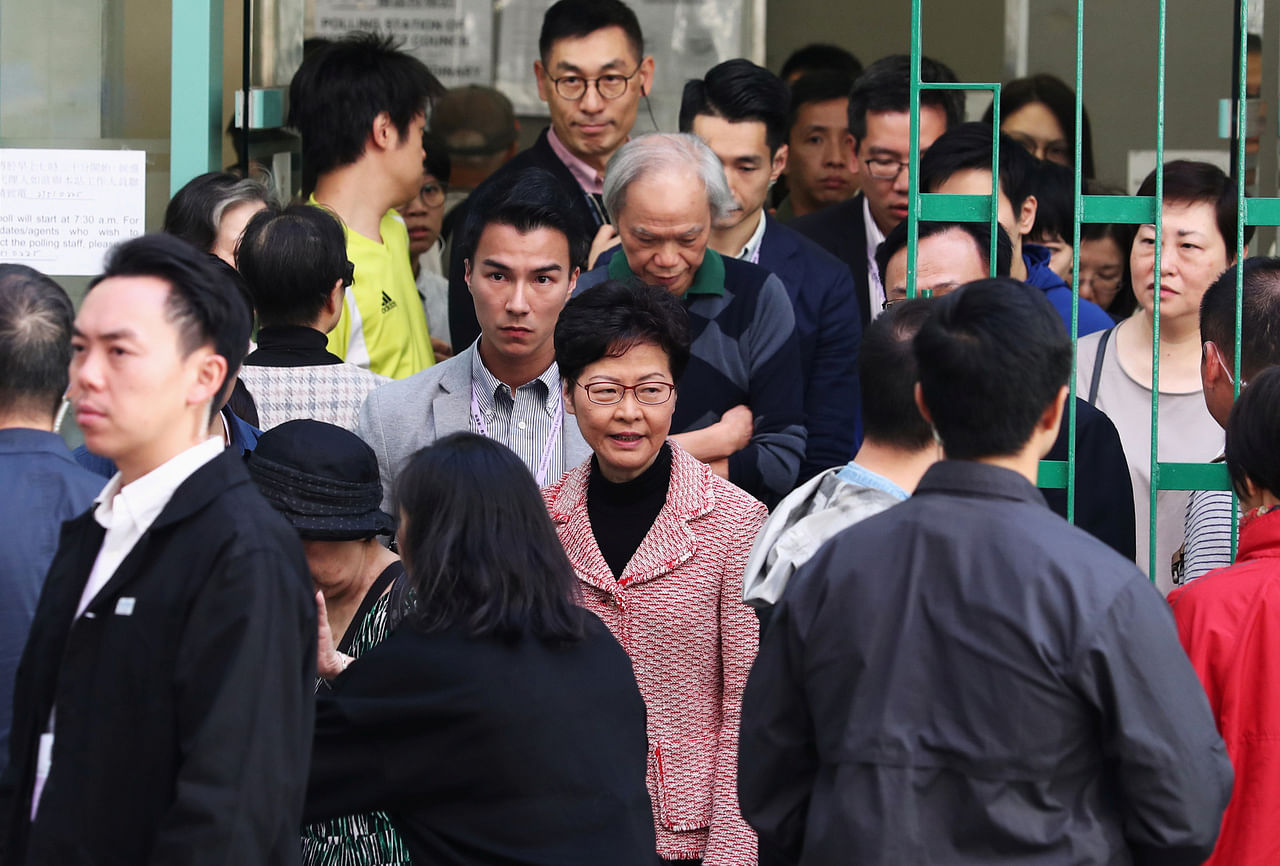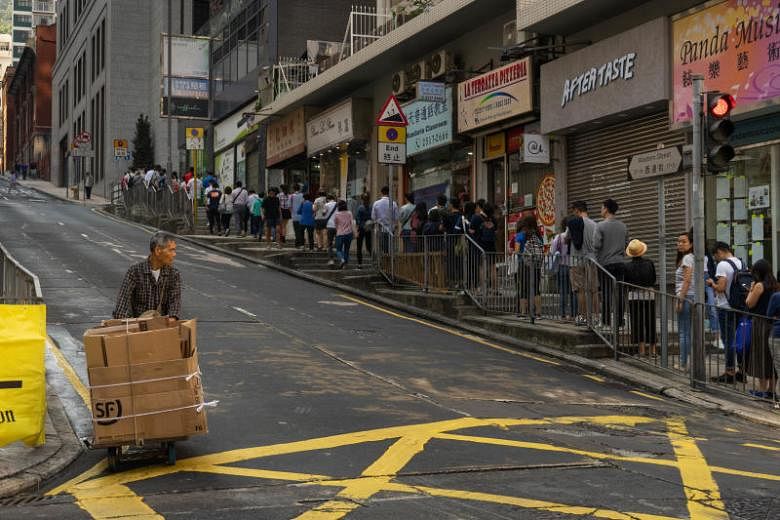HONG KONG (BLOOMBERG) - More than a million Hong Kong people had cast their ballots in local elections by about midday on Sunday (Nov 24), almost tripling the turnout from four years ago, as they seized the first opportunity to vote after five months of violent protests calling for greater democracy.
Residents faced unusually long queues at polling stations for the District Council election across the city, with some people queuing since the early hours of the morning as expectations for a record turnout mounted.
Almost 1.3 million people, or 31 per cent of the electorate, had voted by 12.30pm, according to the government. That compares with the 452,077 who had voted by lunchtime in the last council elections in 2015.
"There's so many people, it's brought tears to my eyes," said Mr Ng Siu Hong, a councillor for the Central and Western District.
"It's good for me but more importantly, good for democracy."
Ahead of the election, Hong Kong officials warned the vote could be postponed after some candidates came under attack and the city was paralysed, with protesters blocking roads and riot police laying siege to a university.
The police dispatched at least two officers clad in riot gear to each polling booth, which are set to close at 10.30pm.
Results are expected in the early morning hours on Monday.
The vote comes at a time of unprecedented political polarisation in the city, with divisions hardening as the protests turn more violent.
While most Hong Kongers support the protesters' goals of an independent inquiry into police abuses and meaningful elections, they're also increasingly fed up with tactics including vandalising transport networks, seizing universities and using mediaeval-style weapons.
"It's kind of a referendum on the government and everything that's happened over the past five months," said Mr Chi-Jia Tschang, who worked at Goldman Sachs for almost a decade and is now a senior director in the Hong Kong office of BowerGroupAsia, which advises companies on business and political risk in the region.
"People still want an opportunity to work within the system to have their voices heard. That's why there's so much focus on this."
The district council is the lowest rung of government in the city and councillors have few real powers, mostly advising the chief executive on matters like fixing up parks and organising community activities.
Its elections have typically been plagued by low voter turnout and aren't hugely competitive, compared with those for the Hong Kong's more powerful Legislative Council.
But they're being closely watched this year, being the first democratic exercise since the protests began in June. Enthusiasm is high among pro-democracy forces, who are hopeful they can pressure Chief Executive Carrie Lam's administration to become more compromising.
Mr Lord Alton of Liverpool, an independent election observer who will be visiting areas around polling stations in the afternoon, was upbeat about the situation.
"The turnout is significantly up so far on previous elections, more than double from four years ago," he said.
"The absence so far during the day of protests means there shouldn't be any negative reason for people feeling unable to go out to vote."
District councillors help appoint 117 of the 1,200 electors who select the chief executive, which would give pro-democracy forces more choice over candidates who must nevertheless still be approved by Beijing.
The councillors are also directly elected by the public, making it a more democratic process than the contest for the Legislative Council, which has reserved seats for members of the financial hub's business community.
As she cast her vote, Mrs Lam said that the Hong Kong government would continue to support the district councillors.

She said she expects a relatively peaceful and calm election even as the city faces an "extremely challenging" situation.
With the risk of violence ever present, the government said on Friday that opening hours for polling stations would be extended if voting can be resumed within 90 minutes of any unexpected disruption.
If not, then voting would be suspended until Dec 1.
The vote comes as dissatisfaction with the government's performance increases because of the ongoing protests triggered by legislation allowing extraditions to mainland China.
People's unhappiness with the administration rose to 80 per cent from just 40 per cent a year ago - well before the unrest began - according to surveys by the Hong Kong Public Opinion Research Institute.
Mrs Lam's popularity, meanwhile, has fallen to record lows as peaceful marches five months ago were ignored and demonstrators began clashing with police, with the protest movement morphing into a wider pushback against Beijing's grip.
"People now realise that you can take things to the streets, but at a very high cost - and there is a limit to one's energy," said Ms Claudia Mo, a pro-democracy lawmaker in the city's Legislative Council.
"You need changes from within this rotten system."










